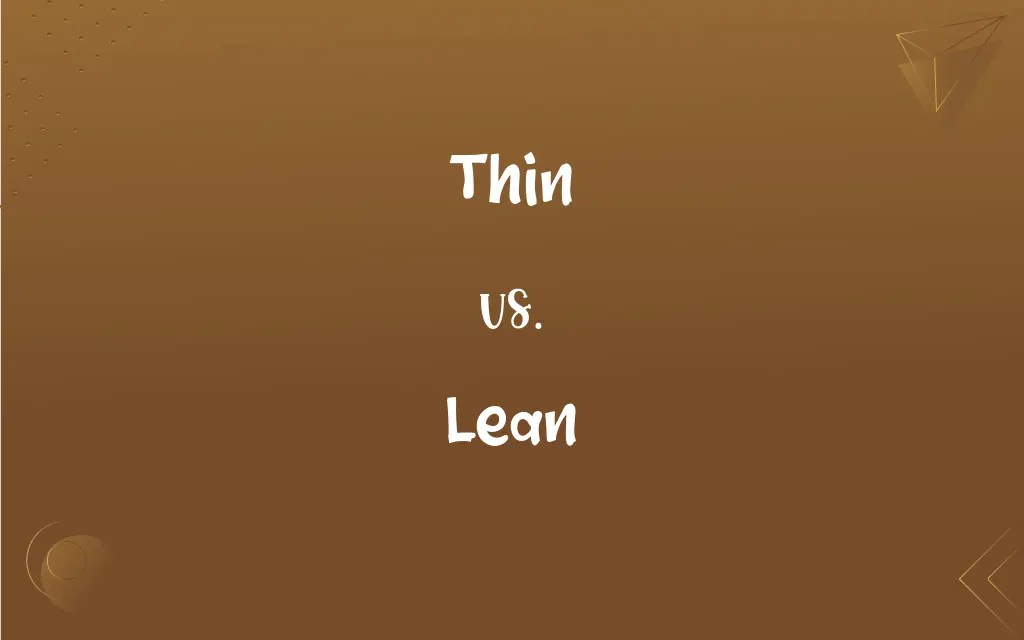Thin vs. Lean: What's the Difference?
Edited by Aimie Carlson || By Janet White || Published on February 5, 2024
Thin refers to having little fat or flesh, often implying slightness, while lean describes a healthy, toned physique with low body fat.

Key Differences
The term 'thin' is generally used to describe a body type or physical state where there is a lack of fat and possibly muscle, often implying slenderness to the point of being underweight or frail. 'Lean,' on the other hand, suggests a body composition that includes a healthy balance of muscle and a low percentage of body fat, often associated with fitness and health.
Thinness can result from various factors including genetics, diet, or health conditions, and does not necessarily indicate physical fitness or strength. In contrast, being lean usually implies the result of regular exercise and a nutritious diet, highlighting muscle definition and strength rather than just low body weight.
In everyday language, 'thin' can have a broader application, describing anything slender or fine in shape or thickness, like a thin slice of bread. 'Lean,' however, is mostly used in the context of body composition and meat with little fat, and is seldom used to describe non-physical attributes.
The societal perception of being 'thin' can vary, sometimes viewed positively for its association with slenderness, but also potentially carrying negative connotations of weakness or lack of health. 'Lean' typically has a positive connotation, linked with athleticism, good health, and strength.
In terms of health implications, being excessively thin can sometimes indicate undernourishment or an underlying health issue. Being lean, if achieved through healthy means, is often considered beneficial for overall health, reducing the risk of various diseases associated with high body fat.
ADVERTISEMENT
Comparison Chart
Definition
Lacking in fat and possibly muscle
Having muscle and little body fat
Connotation
Can be neutral or negative
Generally positive
Indication
May suggest underweight
Suggests fitness and health
Health Implications
Could indicate undernourishment
Often associated with good health
Common Usage
Describes physical form, objects
Used for body composition, meat
ADVERTISEMENT
Thin and Lean Definitions
Thin
Having little flesh or fat.
She looked thin after her long illness.
Lean
Muscular and well-defined.
Her workouts resulted in a lean, toned body.
Thin
Slight or slender in form.
The thin branches swayed in the wind.
Lean
Meat with little fat.
The recipe called for lean cuts of beef.
Thin
Scant or limited in amount.
The soup was thin and lacked flavor.
Lean
To incline or bend from a vertical position.
He leaned against the wall, waiting.
Thin
Lacking in density or fullness.
His hair was beginning to grow thin.
Lean
Having a low percentage of body fat.
He maintained a lean physique through exercise.
Thin
Fine or small in thickness.
She sliced the cheese thin for the sandwiches.
Lean
Efficient and without excess.
The company's lean operations maximized profits.
Thin
Relatively small in extent from one surface to the opposite, usually in the smallest solid dimension
A thin book.
Lean
To bend or slant away from the vertical.
Thin
Not great in diameter or cross section; fine
Thin wire.
Lean
To incline the weight of the body so as to be supported
Leaning against the doorpost.
FAQs
What does it mean to be thin?
Being thin means having little body fat and flesh, often implying a slender or slight body.
Is being lean the same as being healthy?
Being lean often indicates good health and fitness, but it depends on how it's achieved.
What is the definition of lean in terms of body composition?
Lean in terms of body composition refers to having low body fat with noticeable muscle definition.
Does thin always imply unhealthiness?
Not always, but being excessively thin can sometimes indicate health issues or undernourishment.
How is lean meat different from regular meat?
Lean meat has less fat content compared to regular cuts of meat.
Can someone be thin but not lean?
Yes, someone can be thin without being lean, if they lack muscle mass.
Can thin also refer to objects?
Yes, 'thin' can describe objects that are slender or fine in shape or thickness.
Is achieving a lean physique usually associated with exercise?
Yes, achieving a lean physique typically involves regular exercise and a balanced diet.
Do thin and lean have the same connotations?
No, 'thin' can have neutral or negative connotations, while 'lean' is generally seen positively.
Can 'lean' refer to business models?
Yes, in business, 'lean' refers to efficiency and lack of excess.
Are there health risks associated with being too thin?
Yes, being too thin can lead to health risks like malnutrition and weakened immunity.
What exercises contribute to a lean body?
Strength training and cardiovascular exercises contribute to developing a lean body.
How can someone transition from thin to lean?
Transitioning from thin to lean typically involves strength training and a nutritious diet to build muscle and reduce fat.
Can thinness be genetic?
Yes, genetics can influence a person's propensity to be thin.
Can thin people have high body fat percentages?
Yes, thin people can have a high body fat percentage, a condition known as 'skinny fat.'
Does lean mean strong?
Lean often implies muscular strength and fitness, but not necessarily in terms of physical power or bulk.
How do societal perceptions of thin and lean differ?
Society often views 'thin' in varied ways, from fashionable to unhealthy, while 'lean' is usually associated with fitness and health.
Is lean always about physical appearance?
Mostly, but it can also refer to efficiency in other contexts like business or operations.
What role does diet play in being lean?
Diet plays a crucial role in being lean, especially in reducing body fat and building muscle.
Is being thin a reliable indicator of health?
Being thin is not always a reliable health indicator, as it doesn't account for muscle mass or overall physical condition.
About Author
Written by
Janet WhiteJanet White has been an esteemed writer and blogger for Difference Wiki. Holding a Master's degree in Science and Medical Journalism from the prestigious Boston University, she has consistently demonstrated her expertise and passion for her field. When she's not immersed in her work, Janet relishes her time exercising, delving into a good book, and cherishing moments with friends and family.
Edited by
Aimie CarlsonAimie Carlson, holding a master's degree in English literature, is a fervent English language enthusiast. She lends her writing talents to Difference Wiki, a prominent website that specializes in comparisons, offering readers insightful analyses that both captivate and inform.







































































